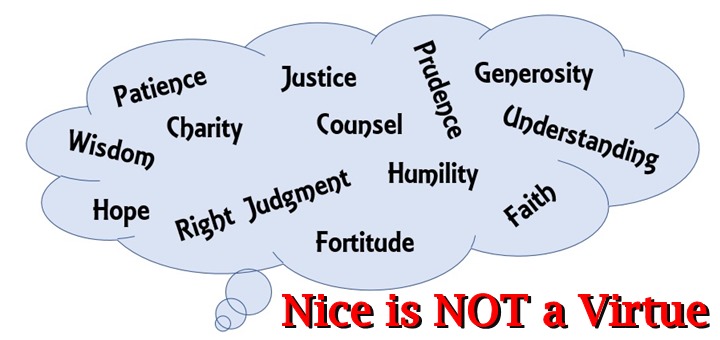I love our community here at Catholicmom.com. Every day there are so many good ideas, reflections and ways to grow as women, as moms and as Catholics in general. A few weeks ago Sterling Jacquith posted about training our children in the virtues. It prompted me to think about how my husband and I are raising our children and especially the way we talk about behavior.
For starters, what are the "virtues"? According to the Catechism of the Catholic Church:
A virtue is an habitual and firm disposition to do the good. It allows the person not only to perform good acts, but to give the best of himself. The virtuous person tends toward the good with all his sensory and spiritual powers; he pursues the good and chooses it in concrete actions. (CCC 1803).
The Church identifies 3 groups or categories of virtues. The Cardinal Virtues (Temperance, Prudence, Justice and Fortitude), the Theological Virtues (Faith, Hope and Charity) and the Capital Virtues (Chastity, Generosity, Brotherly Love, Temperance, Meekness, Humility, and Diligence). Plus we have the Gifts of the Holy Spirit (Wisdom, Understanding, Counsel, Fortitude, Knowledge, Piety, and Fear of the Lord) and the Fruits of the Holy Spirit (Charity, Joy, Peace, Patience, Kindness, Goodness, Generosity, Gentleness, Faithfulness, Modesty, Self-Control, Chastity). You will notice some overlapping, and that's ok.
Look at all those words we have to work with while raising our children! It's amazing, actually. With all the emphasis on early childhood development and language skills, you would think that such a wide range of words to identify good behavior would be on the tips of everyone's tongues. But how often do you hear parents say things like:
"Thank you for your generosity."
"Please serve your sister first, then yourself."
"We use kind words in our family."
"It's important to be humble, no matter if you win or lose."
[tweet "Nice is not a virtue. In parenting, be concrete about expectations. By @KateTaliaferro"]
In my experience, the most common thing parents tend to say when trying to instruct a child is "That is/is not nice." My friends, nice is not a virtue. In fact, I would argue, it is such an overused word it doesn't really mean anything. It definitely does not tell a child much about how well or poorly they are behaving. It also means we aren't thinking very creatively as parents. Thanks to Sterling's article, my husband and I noticed we were frequently falling into this "nice" trap. These past few weeks we have stepped up our virtue identification and we are seeing positive results. Plus, we are having good conversations about what these new words are and mean.
The importance of words
I am personally very interested in how the words we use shape our perspective. The words we use to describe actions and opinions fundamentally shape the way we understand them and how they are presented to others. Think about how as a society we have improved the way we speak about persons with disabilities or special needs. Today, we put the individual first before identifying their disability. We are upholding their dignity as a person through our language, rather than using language to labeling them as a problem the way society did for many years. Language fundamentally shapes and reinforces the proper mindset we now have.
The same understanding can be applied to the virtues. If we expect our children to be patient, we need to talk about having patience, especially in moments when they display it or need to work on it. If we want a society that practices chastity and modesty, we need to explain to our children what modest and chaste behavior look like (and practice them ourselves). When our children are generous, we need to praise them for it. When they are lacking in self-control, we need to point it out.
Pointedly identifying our use or lack of virtues should be part of our daily conversations with our children. Just like we teach them blue from green and how to count to 10, our home should be the first place they are trained in the virtues.
What virtues do you talk about most often with your children? Which do you want to talk more about? What virtues do you personally need to work on so you can be a better example for your children?
Copyright 2017 Kate Taliaferro
About the Author

Kate Taliaferro
Kate Taliaferro is an Air Force wife and mom of 6. She has a Masters in Religious Education and tries to find God's presence in all parts of her day, be it cooking, cleaning or just the everyday ordinary. She enjoys homeschooling, stitching crafts and finding cheerios between the couch cushions. She blogs at Daily Graces.



.png?width=1806&height=731&name=CatholicMom_hcfm_logo1_pos_871c_2728c%20(002).png)
Comments